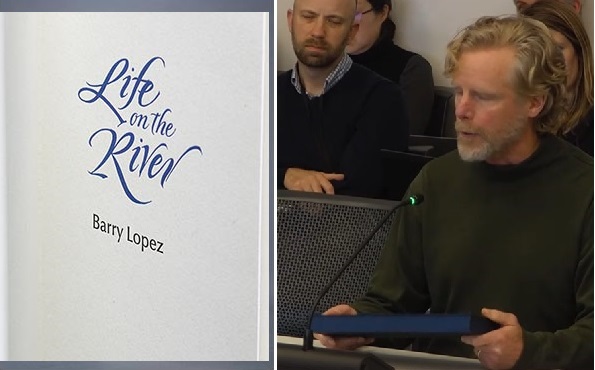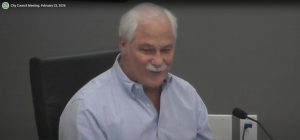Public comments thank Matt McRae, urge EWEB to expand social and community goals
8 min read
Presenter (Your Voice Here): EWEB heard public comments Dec. 3 thanking Matt McRae, requesting fee waivers for smart meter opponents, pointing out our current reliance on fracking, and expressing disappointment with the rate design. The first speaker referenced previous comments by EWEB’s general manager. At the October meeting, Frank Lawson:
[00:00:20] Frank Lawson (EWEB, general manager, October 2024): While these are not in particular mutually exclusive, there are tensions between different priorities and different aspects of rate design, and those three are categorized as really cost alignment, behavioral, and then social/community priorities.
[00:00:37] Presenter (Your Voice Here): Later in that October meeting, a question from board member Matt McRae.
[00:00:42] Matt McRae (EWEB, board member): I just have one question. It says, ‘Other than through beneficial consumptive behavior, electricity and drinking water rate design will not be used to advance broader social priorities.’
[00:00:51] And I agree, I think we all want to be focused on the utility and what the utility can do about consumption of water and electricity. But I’m curious where you see that boundary. As that goes up, what are the things that are off the table to try and influence through our rates?
[00:01:07] Presenter (Your Voice Here): Frank Lawson.
[00:01:08] Frank Lawson (EWEB, general manager): Well, one of the requests that we’ve gotten, and I don’t particularly think it aligns with what we’re trying to do with rate design, is this notion that different customers should pay different rates based on their own characteristics.
And I’ll just throw income in as an example, that in some of the proposals have had income-based rates. And I don’t feel like that’s the proper use of rate design in the strategic direction that we’re going.
[00:01:37] Presenter (Your Voice Here): With the first public comment Dec. 3, Danny Noonan.
[00:01:40] Danny Noonan: My name is Danny Noonan. I’m a climate energy strategist with the local nonprofit organization Breach Collective.
[00:01:48] Yesterday evening I received correspondence from General Manager Lawson regarding the letter that was sent to EWEB commissioners by a coalition of 18 organizations in July of this year.
[00:01:59] Given the timing of this correspondence and the draft rate design plan discussion that’s on this evening’s agenda, I decided to attend this evening’s meeting in order to offer an initial personal response to that letter.
[00:02:14] While it has been encouraging to see EWEB commissioners and staff engage with our coalition’s recommendations and advocacy over the last six or so months, I was disappointed by how some of our recommendations have been framed in subsequent discussions and are now seemingly at risk of being precluded from further exploration in the rate design process.
[00:02:35] Specifically, General Manager Lawson wrote that EWEB’s draft rate design plan, quote, ‘reflects the Board of Commissioners’ preference for structuring rates around a dual philosophy of cost- and behavior-based principles rather than basing rates on socially driven goals or outcomes,’ end quote.
[00:02:51] This would appear to contradict General Manager Lawson’s own comments during the October meeting that these three philosophies, while in tension with each other in creating a trilemma, are not mutually exclusive in rate design.
[00:03:04] This framing also looks past the fact that socially-driven goals like low-income assistance are already an accepted and uncontroversial feature of EWEB’s rate design. Yet this framing serves to constrain further discussion around how best to design and provide low-income assistance.
[00:03:20] This is particularly disappointing to see at a time when investor-owned utilities in Oregon are responding to community advocacy at the PUC by expanding and improving their low-income assistance programs.
[00:03:32] It also feels somewhat misleading for General Manager Lawson to lump together both our proposal for a percentage of income payment program as a potential alternative to EWEB’s existing low-income assistance and income-graduated fixed charges as a potential component of rate design as amounting to a general proposal for income-based rates.
[00:03:54] That is simply to say that EWEB could include these mechanisms within a rate design that still predominantly adheres to cost and behavior-based principles.
[00:04:03] Additionally, EWEB staff and commissioners’ heavy focus on incentivizing customer behavior through rates continues to overlook one of the core characteristics of our community. Namely, that Eugene has both a very high proportion of renters and a very low vacancy rate. This gives the average renter very little agency over the energy efficiency and weatherization of their dwelling and the ability to which they can change their behavior through incentives.
[00:04:25] That’s been my personal experience as a renter.
[00:04:27] Presenter (Your Voice Here): Mark Robinowitz.
[00:04:29] Mark Robinowitz: OK, for outgoing commissioner Matt McRae. Thanks again for helping bring Richard Heinberg of Post-Carbon Institute to Eugene. I wish, however, that our institutions had been able to hear anything that he says about limits to growth on a finite planet and why this requires us to rewrite plans, change laws, the structures of our community’s function, and radically increase the amount of cooperation.
[00:04:59] Around 2008, we had a stay of execution around concerns that peak energy would constrict our society with the startup of hydraulic fracking as a means to scrape the bottom of the barrel (the oil barrel) for extraction in Texas and the Rockies and Appalachians. Oregon’s tiny natural gas field near Astoria has been depleted and it’s not the right geology for fracking, nor is Prudhoe Bay in Alaska.
[00:05:30] Prudhoe Bay has declined more than three-fourths since its peak in 1988, which is of concern to anyone who relies on trucks bringing food to grocery stores. These and other warnings about the polycrisis, limits to growth, climate chaos, overconsumption, overpopulation, are not happy messages about our techno-utopian future.
[00:05:53] To paraphrase Albert Einstein: Passing the limits to growth has changed everything, save our mode of thinking, thus we drift toward catastrophe. He was talking about the splitting of the atom, but it applies beyond that.
[00:06:08] The adoption of large-scale burning of (un)natural gas as the backbone of the electric grid has been due to the rise of fracking. Now fracking is the largest energy source for the Western, Eastern, and Texas grids, which EWEB never mentions in its public literature to the public. How about mentioning Western Electricity Coordinating Council, which EWEB is part of, for broader understanding of where we are at?
[00:06:37] There is a debate in the geology community about how long fracking will last, but even if it lasts another decade or two, it’s a temporary blip on human history. And regardless of which geologist is right, it’s just another boom and bust.
[00:06:54] In 2000, David Brower, one of the greatest environmentalists, give his farewell speech to the Environmental Law Conference at U of O. He said that at our best we’ve slowed down the rate that things get worse, and this was not good enough for our survival. Now, thanks to baby steps, collective denial, and a profound lack of courage, we will all face the consequences. So think about future generations of all species.
[00:07:21] Presenter (Your Voice Here): Alan Gormezano.
[00:07:22] Alan Gormezano: Hello again and thank you for honoring the fact that I rode here on a bicycle through the freezing cold to get here and walked in later than I thought I would. Thank you for having me talk…
[00:07:33] You know a lot of times I talk about the cost of just looking at efficiency versus the cost of human health and how it affects humans on a daily basis and right now we’re faced with an incoming government that is going to create a department that I’m going to call “Dog-E”, D-O-G-E, Department of Government Efficiency, which is going to be focused on efficiency, efficiency, efficiency, and being someone who just joined that “privileged” rank of seniors on a fixed income, I look at, that might just be disappearing very soon because of their focus on efficiency, efficiency efficiency, without looking at the human costs, the human values. So those of you who do look at those things, thank you.
[00:08:23] Obviously, I’ve been involved with the fight against getting the smart meters put on our house against our will. And a lot of people feel like we’re being punished, you know, over that with certain rate increases or people having to have the broadcasting turned on when they don’t want it turned on. I fortunately didn’t have to have it turned on because I gave in.
[00:08:43] But you know, one place to help low income people, such as me, such as some of the other people in our group is, you know, for those of us who don’t want the broadcasting turned on, instead of charging us extra for the meter readers coming out, which we’ve already been paying for all along, don’t add that onto our bill. That’s one way to make it easier for some of us low-income people.
[00:09:08] And definitely look at some way, let’s get on it, get these raids down for those of us who are struggling, because we really, really would like to keep our electricity going, and I’m sure you don’t want to see us out in the cold, even though you make me ride here on a bicycle in the cold. So thank you very much.
[00:09:25] Presenter (Your Voice Here): Joe Moll.
[00:09:26] Joe Moll: Joe Moll, representing McKenzie River Trust. I come today simply to say thank you in part for your leadership as I understand this is your last meeting.
[00:09:35] Twenty years ago this week I accepted the job as executive director of the McKenzie River Trust. And I’ve said it before, but it’s worth repeating that there’s no way that either the McKenzie River Trust, the watershed councils in this area, the soil and water conservation districts, and a number of other organizations that work on behalf of the rivers—not just the McKenzie, but the community—would be nowhere near where we are without the leverage that investments by the Eugene Water Electric Board made before 20 years ago, but certainly since that time. So I just want to thank you again for that.
[00:10:07] We’ll continue to come back as we develop more partnership work for the Coast Fork and Middle Forks with that coinciding with the new water plant. I think the opportunities to invest again, looking upstream will be strong there, but I also wanted to present you and perhaps presenting this with the chair, with a copy of something called Life on the River.
[00:10:28] This was something that Barry Lopez wrote on our behalf after the acquisition of the Finn Rock Reach area back in 2016 and 2017. This is something that was hand-printed by Lone Goose Press.
It was a press that came out of the University of Oregon years ago, and this is one of (I think) six copies that Barry signed directly to the Eugene Water and Electric Board and it has sat in a box post-COVID and post-move and then I realized we still had it.
So I thought it would be appropriate to do that. So I don’t know if it’s appropriate to approach the board to present this, but it’s simply to say, ‘Thank you,’ and we’ll continue to work together on these things.
[00:11:05] Presenter (Your Voice Here): Outgoing EWEB commissioner Matt McRae is thanked, as EWEB hears public comment Dec. 3.




